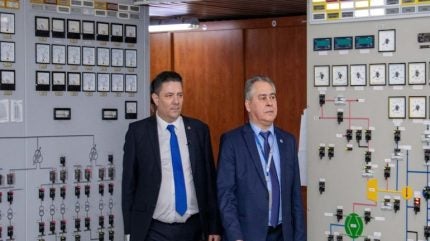
Ramil Galiyev, who was recently appointed General Director of JSC Operating Organisation of Zaporizhia NPP (EP ZAES), has spoken about his plans for the future of the NPP. Galiyev, who assumed his new post at the end of November, was previously Director of the Safety & Production Control Department of Russian nuclear utility Rosenergoatom, with earlier experience at the Balakovo, Rostov and Smolensk NPPs.
The press service of Zaporizhia NPP (ZNPP) noted that in October 2022, the right to manage the plant was transferred to EP ZAES, which is responsible for ensuring the safe operation of nuclear power units and the professional activity of plant personnel. However, Yuriy Chernichuk ZNPP Director and is first Deputy General Director EP ZAES.
At the end of December, Galiyev announced his intention to obtain an operating licence for ZNPP unit 1 by the end of 2025. “We expect to get a licence for the first unit of Zaporizhia NPP by the end of 2025. By that time, it is necessary to achieve full readiness for safe operation of the station, ” he said during a video conference with First Deputy of the Presidential Administration of the Russian Federation Sergey Kiriyenko (a former Rosatom Director General).
In accordance with Russian legislation, the next step is to obtain licences for the operation of the remaining power units, ZNPP said on its Telegram channel. However, Rosatom has repeatedly made it clear that it has no intention of restarting any of the ZNPP units while the military conflict continues. Nevertheless, preparations will continue.
Asked how he felt about assuming responsibility for ZNPP he said: “If the leaders of Rosenergoatom and Rosatom trust me, if they decided that I can cope with this work, then you can’t refuse. I have been set the task – I will solve it.”
He added: “I am assessing the current situation on the site. My principle is to solve difficult problems immediately, and the impossible a little later.” He drew an analogy with chess. “There are no unresolved issues…. Chess is a strategic game, and here, in the new workplace, there are many tasks, but they will be solved exactly the same way: you need to prioritise, break each process into stages, and then the result will be achieved.”
He discussed plans for reorganisation. “There are plans to transfer the station to a new organisational structure. Currently, the facility operates without a workshop structure, and we must switch to the standard structure for Rosenergoatom NPPs. This is primarily involves the outsourcing of certain types of activities: transportation services, catering, cleaning and decontamination. There will be no revolution now, but one of the main tasks is to form a workforce that corresponds to the new organisational structure, the same as at other NPPs in the country [Russia]. This structure is more flexible and will help solve specific problems that we face. In this regard, personnel changes are inevitable, but not to the detriment, but to the development of the station.”
He said there were three main tasks for 2025. “Of course, the first and main task is to ensure the proper level of safety of the nuclear units. I understand that this decision depends not only on us, but we will do everything in our power.”
The second task “is to prepare units for transfer to generation mode. Currently, all six units are in cold shutdown. It is necessary to ensure that NPP equipment is maintained to a high degree of readiness for startup and to extend the operating life of power units”. He added: “We are preparing a package of documents for Rostekhnadzor to obtain a licence to operate the first unit. And then the rest. And in the future, as soon as the situation allows and an appropriate decision is made, we will put the units of ZNPP into operation.”
The third task “is to replenish the water supply in the ZNPP cooling pond; the water level is decreasing due to the destruction of the Kakhovka Reservoir dam. A decision was made to manufacture new pumping station equipment and install it in the Dnieper riverbed”.
Asked what assistance was available for ZNPP, Galiyev noted many nuclear industry enterprises were offering support. “Ever since the station was transferred to the management of a subsidiary of Rosenergoatom, employees from various industry enterprises have been constantly present. For example, to strengthen the operational staff at ZNPP, specialists have been sent from other plants – Balakova, Kalinin , Rostov – these are enterprises that are similar to ZNPP. More than 100 people regularly come on duty; they live in a special building at the station. When I arrived at the site, the first thing I did was visit this building to see how the seconded specialists lived and what they needed.”
He added: “Rosenergoatom has a support group that helps ZNPP switch to Russian legislation and develop all the necessary documents. For example, the Department of Safety & Production Control, which I previously headed, helped the station in registering all hazardous production facilities. All industry efforts are aimed at ensuring that the station can operate within the framework of the requirements of Russian legislation, so that personnel effectively carry out their professional activities and ensure the safe operation of the facility.”






